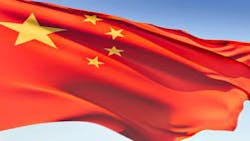China's manufacturing activity contracted for an 11th straight month in September, banking giant HSBC said Thursday, as factories struggled with weak demand and hard-to-sell inventories.
The preliminary reading of the purchasing mangers' index (PMI) released by the British bank hit 47.8 this month, a mild improvement from a final reading of 47.6 in August, HSBC said.
But the latest reading marked nearly a year of continuous contraction since November, underscoring broader economic weakness and shrinking demand in key overseas markets.
China's official PMI figure for August released earlier this month hit a nine-month low of 49.2.
Qu Hongbin, HSBC's Hong Kong-based chief economist for China, said the lackluster manufacturing activity in September was due to "weak new business flows and a longer than expected destocking process."
But he said effects of the loosening measures authorities have taken in response to slowing economic growth should start to kick in during the next quarter.
"The recent easing measures should be working to lead to a modest improvement from the fourth quarter onwards," he said.
Authorities this year have tried to boost the economy with interest rate cuts and by lowering the amount of cash banks must keep on hand in a bid to spur the kind of lending that could stimulate stronger growth.
China's economic growth slowed to 7.6% in the three months through June, the sixth straight quarter of weakening expansion and the worst result since the height of the global financial crisis.
Weak economic data in the current third quarter have raised fears China's growth may have slowed for a seventh straight quarter when gross domestic product figures are released next month.
Problems in the broader global economy, including Europe's prolonged debt crisis and a sluggish recovery in the United States -- both major trading partners for China -- have been a drag on growth.
Analysts at consultancy Capital Economics expect China's third-quarter growth to further slow to 7.1% due to uncertainties in the country's property sector and the ailing global economy.
"Overall, there is not enough in the latest data to be confident the economy has turned the corner, though momentum does at least appear stable," they said in a report Wednesday, referring to previously released government figures.
Yao Wei, economist at Societe Generale in Hong Kong, said that a "temporary recovery" in China's economy could be expected in the fourth quarter as funds for infrastructure projects announced in past months are gradually invested.
However, uncertainties remain after policy makers have been cautious in imposing aggressive stimulus steps on concerns over banking risks after new loans doubled over the past three years.
"It is very hard and slow for China's manufacturing sector to recover without sweeping stimulus measures," she said.
Premier Wen Jiabao said this month that China is still likely to achieve its annual economic growth target of 7.5%. Even so, that would mark a significant slowdown from 9.3% growth in 2011 and 10.4% in 2010.
The commerce ministry said Wednesday that China faced "enormous difficulties" in meeting its target to maintain 10% growth in trade this year, citing weak overseas demand as the world economy remains under pressure.
- Fran Wang, AFP
Copyright Agence France-Presse, 2012
About the Author
Agence France-Presse
Copyright Agence France-Presse, 2002-2025. AFP text, photos, graphics and logos shall not be reproduced, published, broadcast, rewritten for broadcast or publication or redistributed directly or indirectly in any medium. AFP shall not be held liable for any delays, inaccuracies, errors or omissions in any AFP content, or for any actions taken in consequence.
